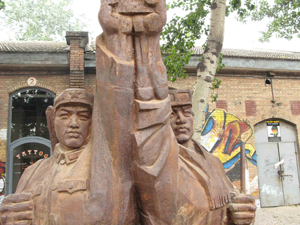China after the 2008 Beijing Olympics: the party must go on
Mara Lisa Arizaga *
China’s rapid economic development forms the basis of the legitimacy of the Chinese Communist Party (CCP), which has taken credit for the bonanza of recent years and the success of the reforms initiated by Deng Xiaoping at the end of the 1970s. The party’s discourse has managed to equate modernisation with the maintenance of the territorial integrity of the nation and so to weaken the separatist tendencies of many of its ethnic minorities.
However, these successes have brought with them a growing gap between those who have benefited from rapid economic growth and those who are falling ever farther behind.

Distrito Artístico de Dashanzi- Beijing- 2007
Other factors to be considered include the rising rate of inflation, the massive migration from the countryside to the big cities in search of a better future (1) and a high infant mortality (2) rate as well as a social memory shot through with the dramatic events which have occurred since the rise to power of the CCP, among them the Cultural Revolution (1966 -1976). Economic progress serves to bind these wounds but the bad memories have the capacity to quickly rise to the surface among those sectors of society which have not managed to benefit from the prosperity associated with modernisation.
The image promoted by the state of a stable and harmonious China, the leading priority of the CPP in the run up to the 2008 Olympics, goes together with the fear of the loss of stability and control, something which became apparent in the light of events in Tibet this year.
Given this situation, the classic recourse to ethnic Chinese nationalism finds itself confronted with so-called ethnic nationalism, especially that of the Tibetans and Uighurs. So-called state nationalism is aware of the potential of ethnic nationalism as well as the fact that many citizens do not have real ties to the existing political authorities.
This is the context in which the world turns to China as we approach the 2008 Olympic Games. However, the view from abroad has not been as benevolent as the Chinese would have liked. The sharpening of foreign criticism in the months leading up to the games, especially in the area of human rights and culminating in the release of the Amnesty International report (3) just days before their opening of the games has been notable and has led to an intensification of nationalist feeling in China and generated massive demonstrations, such as those outside the French Carrefour supermarket chain, in retaliation for the earlier protests against the parading of the Olympic flame in Paris.
These spontaneous waves of feeling, defending the unity and image of the nation could easily rebound on the government, something it is very aware of when it considers the increasing number of demonstrations by the marginalised in the interior of the country. In many cases these demonstrations have been provoked by cases of corruption, problems with local authorities, rising food prices and rises in the cost of living in general, as well as unemployment, problems in the property market, a possible energy crisis, the degradation of the environment and latent social and political tensions.
This year has not been an easy one for China. As well as all the aforementioned problems it has had to deal with a huge natural catastrophe in the shape of a massive earthquake that struck the province of Sichuan in May. (4)
It is unlikely that the recourse to nationalism will be able to deal with all of the problems producing discontent. These can only be dealt with by further reforms, especially in matters related to social welfare and the construction of institutional mechanisms that would protect the rights of the most marginalised sectors of society, including ethnic minorities.
When the party ends and the Olympic Games are history, China will be faced with a complex panorama, one in which the “harmonious society” and stability will be experiencing a period of fragile equilibrium.
* Doctoral candidate, Central University for Nationalities of China. Master’s in Chinese Economy, Society and Culture, Institute of Higher University Studies, Spain. Resident in China since 2003)
(1) See "One Year of My Blood": Exploitation of Migrant Construction Workers in Beijing, Human Rights Watch, UNHCR Refworld (unhcr.org), Volume 20, No 3, 12-03-2008
(2) According to a UNICEF report, the infant mortality rate among the poor remains very high. See: http://www.unicef.org/infobycountry/china_china.html
(3) Amnesty International, People's Republic of China: The Olympics countdown - broken promises, July 2008. ASA 17/089/2008
(4) The figures speak for themselves. The quake measured 7.5 on the Richter scale and left 100,000 dead and missing, 350,000 injured and more than a million homeless, as well as causing economic losses running to some 20 billion Euros, according to initial official estimates.




